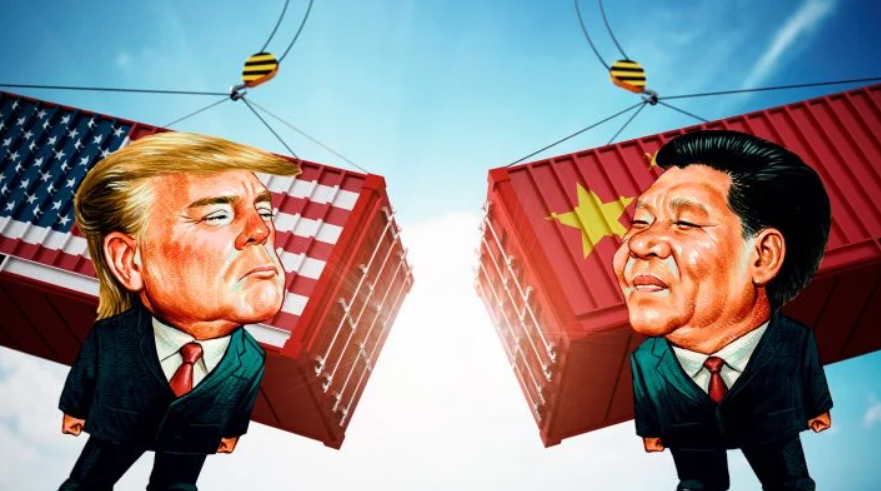Dear valued client,
Markets gained significant ground this week with its best single-day performance since 2008 on Wednesday after the White House announced a 90-day reciprocal tariff pause. The U.S. also released encouraging inflation figures for the month of March, coming in at 2.4% (compared to 2.8% in February and 3% in January), the lowest it’s been since September 2024.
On the geopolitical front, U.S. and Iranian negotiators will meet in Oman this Saturday to discuss Iran’s nuclear program, marking a shift from past talks typically conducted through intermediaries. President Donald Trump described the discussions as “direct” and involving “very high-level” officials, though Iran’s Foreign Minister Abbas Araghchi clarified that the two sides would remain in separate rooms, with Omani diplomats facilitating communication. Trump emphasized the stakes, warning that Iran faces “great danger” if the talks fail, as he insists Iran must not acquire nuclear weapons. While a breakthrough seems unlikely, the talks signal mutual interest in exploring a potential deal. Adding to the diplomatic momentum, leaders of four major Iran-backed militias in Iraq, under pressure from looming U.S. air strikes, expressed readiness to surrender their weapons to Iraqi authorities, a move possibly influenced by the Iran Revolutionary Guard Corps’ willingness to let local commanders decide. Though likely a tactical retreat, this could hand Trump a foreign-policy win without military action.
President Donald Trump’s recent trade policies have sparked opportunities and challenges for the U.S. economy. By pausing most “reciprocal” tariffs for 90 days with a 10% baseline duty, Trump has provided breathing room for many U.S. trading partners, fostering a market rally and signaling flexibility. However, his decision to raise tariffs on Chinese imports to 145% has intensified the U.S.-China trade dispute, prompting China to counter with an 84% tariff, later increased to 125%. These escalating levies have disrupted trans-Pacific trade, with U.S. firms like Amazon canceling orders and Chinese companies idling workers, while also raising concerns about potential price increases despite recent easing in U.S. inflation. Yet, this shake-up is encouraging American businesses to explore new supply chains and innovate, potentially strengthening domestic industries. While markets have faced volatility, Trump remains optimistic about long-term growth, suggesting the U.S. could emerge more competitive if it navigates these disruptions effectively.
I’ve included two commentaries below to provide a balanced perspective of the tariff situation:
Several Wall Street bigwigs voiced strong concerns over President Trump’s recent tariff hikes as markets remain uncertain and volatile. JPMorgan CEO Jamie Dimon warned that tariffs could stall growth and hinted at an overvalued stock market amid rising recession risks, while BlackRock’s Larry Fink argued they’d fuel inflation and keep interest rates high, noting many CEOs already see a recession underway. Billionaire Stanley Druckenmiller opposed tariffs exceeding 10%, and even Trump ally Bill Ackman called for a 90-day tariff pause, citing potential damage to U.S. business credibility and a possible “self-induced economic nuclear winter.” Trump heeded the advice. Investors do not like uncertainty, and the flip-flopping on economic policy makes it difficult to provide the market with long-term direction.
Conversely, hedge fund investor Steve Eisman (played by Steve Carell in ‘The Big Short’) has a more bullish outlook on Trump’s tariff strategy. He argues that the U.S. is well-positioned to prevail due to its economic structure. He highlights that exports make up just 11% of U.S. GDP – far less than the 30% for the EU or 35% for Mexico and Canada, with the latter two heavily reliant on U.S. markets – giving the U.S. a leverage advantage in tariff disputes. Eisman believes this disparity, combined with strengths like full employment, energy independence, and a services-based economy, means the U.S. would suffer less than rivals like China in a prolonged trade war, potentially forcing concessions from nations with weaker bargaining power. While acknowledging market volatility and recession risks tied to Trump’s tariffs, he dismisses threats to the dollar’s dominance and views Trump’s consistent aggression as a strategic edge, a shift from his earlier doubts about U.S.-China trade tensions in 2019.
Time will tell how this all plays out.
“There is an iron law in economics: extremely good and extremely bad circumstances rarely stay that way for long because supply and demand adapt in hard-to-predict ways.” – Morgan Housel
Have a great weekend,
PW



